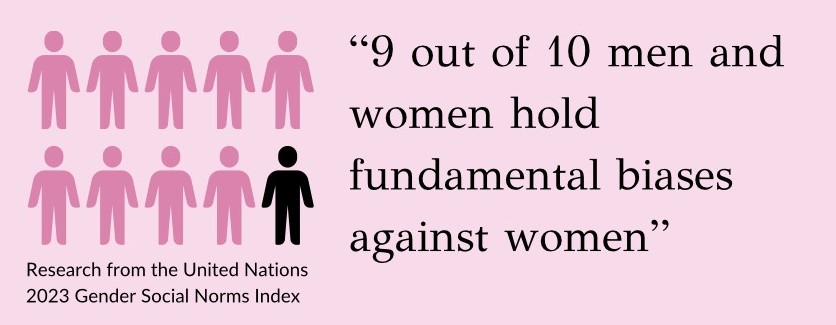I love being a woman. Regrettably, it does come with some downfalls, one being the way we are treated in the workplace. Psych-she investigates the link between feeling like an imposter and the barriers we have to face. Of course, with expert opinion guiding you all the way to hopefully squash the self doubt.
Among the plethora of bullshit women have to put up with, gender discrimination is something that 72% of women have faced in the workplace, a 2022 survey found. Ironically it is no secret that when employees feel valued and happy at work, they are more productive by up to 12%,according to research, but apparently men didn’t get the memo.
Unfortunately the collateral damage of discrimination can manifest into different ways that impact victims of the patriarchy.
For many years, stereotypes, or the bollocks men have made up to hold women back, mean that ‘close to 9 out of 10 men and women hold fundamental biases against women’ according to data from a 2023 survey.

I’m sure we are all aware of the dreaded imposters syndrome, or as some experts call it imposters phenomena which is defined by the National Library of medicine as ‘a behavioural health phenomenon described as self-doubt of intellect, skills, or accomplishments among high-achieving individuals.’
Jemma Roedel, business owner and author of the bestselling book ‘She thinks like a boss: Leadership’ describes: “The niggling feeling of imposter syndrome that many of us carry inside comes into play and it is that little voice that whispers, “Do you really belong here?” every time we reach a new milestone or consider stepping up.”
What is the perfect imposters syndrome recipe you ask? Let’s start off with a sprinkle of discrimination, a dollop of biases and a generous dash of stereotypes that tell women they are not as capable as men, delicious.
Now, don’t worry ladies, we’re going to get to the bottom of this phenomenon and hopefully give you some guidance on how to navigate such an emotion.
Dr Marc Reid, an academic researcher and author of the book ‘You are (Not) a Fraud: A Scientists Guide to the Imposter Phenomenon’ says: “If someone is feeling like an imposter you are going down this very fast thought process of claiming that you are one thing in contradiction to what the evidence says
“This is because you have some receipt that says you are allowed to be there and you are supposed to be there, yet it is as if that goes in one ear and out the other when that thought process in your head
“The crucial thing that separates imposter syndrome from other things is that it is very much tied to a high level of ambition and people who have direction and are striving towards something.”
Now, before I bash men again, research from NerdWallet found that ‘over 3 quarters of UK business leaders have experienced imposter syndrome.’ , showing that we are all at threat of feeling like an imposter.
However, statistics from the house of commons library say ‘a higher share of men than women were working as managers, directors or senior officials’, revealing a potential contributor that could make women feel as though they are an imposter in certain positions.
Before you read the next section, I do not believe that we should all be feeling like an imposter riddled with self-doubt and anxiety– aka a one way ticket to sadness.
However, Dr Reid claims: “If you are not going into situations where you feel like an imposter than you are probably not working on something that is worth your efforts
“That feeling of not knowing enough can sometimes be the exact signal that you need to show that you are where you need to be in order to keep progressing and keep moving on for whatever you want to do in your life and in your career
“All of us get so caught up on the day to day that sometimes it is difficult to step back and look at those simple points that if you are feeling anxious, fraudulence and unknown then maybe that is the very best thing that could be happening to you in that moment and it wont feel like it but with practice becomes more awareness.”
May as well turn that negativity into positivity right?
Of course, this is easier said than done. One thing Dr Reid highlights is the awareness we have to have, before comparing ourselves to others which can be a source of imposter syndrome.
He said: “If you see someone who is a few tangible steps ahead of you that can drive you forward and motivate you. That can go too far when you compare yourself very quickly and instantaneously and really without the full context of how that person got to be where they are
“Your imposter experience can manifest itself in different ways. There are charismatic imposters where they may think that because I am an outgoing person that I get to be where I am and I’m not skilled at anything
“Then there are others who think they are very agreeable as an imposter and say well I never say no to anything and it is just so I do not come across the conflict that would have me found out
“There is also the workaholic imposter who will work themselves to the bone so that they never stop long enough to get found out so they are working hard as a mask as a barrier to someone ever peeking behind the curtain to see what is actually going on.”
What imposter are you sis? That is a joke, but I hope after reading this piece the likelihood of you being any is reduced.
As established, feeling like an imposter is not limited between genders. Unfortunately women do still have to deal with certain obstacles to get to where we want to be.
As Jemma explains: “The physical barriers to career progression might be getting dismantled, these internal battles, like doubting our own worth and capabilities, are still very much in play. Even as the world opens up a bit more flexibility for balancing our personal lives with our careers, we’ve still got to tackle the challenges within ourselves.”
Hopefully one day we will see the gender discrimination gap abolished. For the time being, the research in this piece does show it is moving in the right direction- so that is a win for women.
The next time you doubt yourself however, please think back to this piece as the statistics don’t lie. Women are just as able to slay the workplace, and sometimes better than men.
Expert insight: Jemma Roedel
Jemma Roedel is a successful business owner and author of the Amazon bestselling book “She Thinks Like a Boss: Leadership”. Through her work Jemma aims to empower women in the workplace.
Expert insight: Dr Marc Reid
Dr Marc Reid is a scientist and researcher from the University of Strathclyde. He also has in interest in the imposters phenomena and is the author of the book ‘You Are (Not) a Fraud: A Scientist’s Guide to the Imposter Syndrome’
Featured image: Adobe Stock




